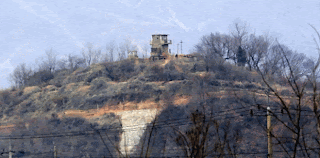
MANILA - Amid intensifying territorial disputes with China and new uncertainty
over the US's military commitment to the region, the Philippines strategic
headaches have been further complicated by the unfolding crisis in Sabah,
Malaysia.
Malaysian armed forces are now
engaged in a full-scale mopping up operation against followers of the
Philippines-based Sulu Sultanate, which launched a rag-tag occupation of a
remote area of the Malaysian state to assert Sultan Jamalul Kiram's historical
claims to the territory. After a long stand-off, Malaysian forces assaulted and
killed several members of Kiram's non-state Royal Security Forces (RSF).
The violence now threatens to
spiral with an estimated 800,000 Filipinos among Sabah's 3.2 million population
and signs of insurgent-style attacks outside of the initial occupation area.
The crisis has ignited popular calls for a re-assertion of Philippine
historical claims to Sabah, an oil-rich, ethnically diverse state on the island
of Borneo that historically has had an uneasy relationship with the Malaysian
federal government in Kuala Lumpur.
Domestic politics have
complicated the crisis. Both Malaysia and the Philippines are in crucial
election cycles, with Philippine President Benigno Aquino facing a de facto
referendum on his rule in upcoming by-elections. Malaysian Prime Minister Najib
Razak is fighting to thwart the political opposition led by Anwar Ibrahim from
making electoral gains at polls that must be called before June.
Neither national leader can
afford to yield the nationalistic high ground or absorb allegations of being
soft on security in relation to Sabah by their respective oppositions ahead of
the upcoming elections. At the same time, the Sabah crisis could have long-term
strategic implications for both countries if myopically handled for short-term
political gains.
For Aquino, the crisis represents
a significant strategic diversion at a time his government bids to shore up its
external security capabilities - including through strengthening ties with allies
like the US, Japan and Australia - vis-a-vis China's rising assertiveness in
the South China Sea. For Najib, the spike in instability has raised
uncomfortable new questions about central sovereignty over outlying areas and
the hitherto unexpected potential for a prolonged and debilitating armed ethnic
conflict.
Given the importance of bilateral
economic ties with China, the Philippines has faced a stark diplomatic choice
between acquiescence and confrontation. Aquino has so far opted for a mixture of
appeasement and hedging with China aimed at securing a multilateral resolution
of the territorial disputes.
Yet two years of intensive talks
and strategic jostling at sea have done little to halt China's perceived
encroachment into the Philippines' Exclusive Economic Zone (EEZ). China has
been able to leverage its influence on Cambodia, last year's chair of the
Association of Southeast Asian Nations (ASEAN), to frustrate any unified
multilateral attempts to build consensus around a binding dispute settlement
mechanism.
That has left the Philippines to
seek external help and military hardware to shore up its ''minimum deterrence
capability''. Manila followed up with an audacious bid to take China to the
International Tribunal on Law of the Seas (ITLOS) to not only settle the
territorial disputes but also to highlight China's expansive nine-dash-line
map, which outlines Beijing's claim to practically all features in the South
China Sea.
China has responded by rejecting
any attempt at third-party arbitration and taking the unprecedented decision to
dispatch an armada of maritime surveillance ships and a Haijian B-7103
helicopter to conduct supposed patrol and observation missions within China's
claimed territories. China has also dispatched more naval assets to consolidate
its claims, including over the Scarborough Shoal, the site of a bitter
stand-off between Filipino and Chinese ships in mid-2012.
Adding to Manila's strategic
anxieties, a cabinet reshuffle in the US has sent mixed signals about America's
military commitment to the region. New Secretary of State John Kerry and
Secretary of Defense Chuck Hagel have both publicly expressed their hopes for a
more amicable strategic relationship with China.
"I'm not convinced that
increased military ramp-up [in the Asia-Pacific] is critical yet," Kerry
argued in his confirmation hearing, signaling a potential new foreign policy
direction from his predecessor Hillary Clinton's 'pivot'. ''That's something
I'd want to look at very carefully."
At the same time, Washington and
Manila held joint military exercises in the guise of humanitarian and disaster
relief training in the Philippine province of Negros Oriental, situated near
some of the contested maritime areas, earlier this month. Those exercises will
be followed in April by the 9th annual ''Balikatan'' joint military exercises
which are scheduled to bring together more than 8,000 Filipino and American
soldiers.
Game of thrones
While Manila recognizes that it cannot
contain China's territorial assertiveness, Aquino and his deputies do maintain
hopes that fellow ASEAN members, especially original and influential states
such as Malaysia, will help to diplomatically resolve the disputes through
multilateral mechanisms.
Judging by the behavior and
pronouncements of Filipino officials during the Sabah crisis, Manila is clearly
trying to downplay the conflict and avoid any deterioration in bilateral ties
with neighboring Malaysia. Some local commentators have even accused the Aquino
administration of speaking on Malaysia's behalf while ignoring the supposedly
legitimate territorial claims raised by the Sulu Sultanate.
Sultan Kiram has repeatedly
sought Manila's support for, among other things, an official appeal to
international arbitration to reclaim Sabah for the Philippines, similar to the
recent submission it made to the ITLOS against China. Instead, in the initial days
of the crisis, the government threatened Kiram and his followers with
prosecution, technically over violating an election period ban on bearing arms.
Manila's behavior has also been
influenced by Aquino's fears that the Sabah crisis could torpedo ongoing
efforts to implement the Framework Peace Agreement (FPA) reached last year
between his government and the insurgent Moro Islamic Liberation Front (MILF).
The deal, which promises to end decades of debilitating armed conflict on the
southern Philippine island of Mindanao, was brokered by Malaysia. Najib
reportedly played a direct role in the diplomacy.
Rival Philippine rebel groups,
including the MILF's mother organization, the Moro National Liberation Front
(MNLF), are now aiming to use the Sabah crisis to scupper the FPA. Former MNLF
leader Nur Misurari has publicly backed Kiram's stance on Sabah, while arguing
that the FPA is invalid unless the government also honors its earlier
agreements with the MNLF on the establishment of an ethnic Moro sub-state. He
has also accused Malaysia of interfering in Mindanao's internal affairs in
order to divert attention from boiling ethnic tensions in Sabah.
With some estimates putting the
total number of Filipinos in Malaysia as high as 1.5 million, the Aquino administration
has expressed diplomatic concerns about the well-being of its nationals amid
the unfolding crisis. There are indications that Kuala Lumpur could use the
crisis as pretext to deport or further marginalize Filipinos in Malaysia.
Approximately 5,000 Filipinos have so far fled the armed crackdown, according
to the Philippine National Disaster Risk Reduction and Management Council.
Aquino's broader geopolitical
need to preserve stable bilateral ties with Malaysia has influenced his so far
soft approach to the Sabah crisis. Critics have accused Aquino of secretly
dropping the Philippines' long-standing claim to Sabah - although
constitutionally the executive has no power to permanently drop territorial
claims without the approval of the legislature and the Supreme Court - to win
Malaysia's support for the FPA.
Some Philippines-based
commentators and former diplomats have argued that Malaysia is loathe to wade
into the South China Sea disputes because of its own strong relations with
Beijing. Others have suggested that Kuala Lumpur, also a claimant in the South
China Sea, has indeed advocated for a more a unified ASEAN voice to deal with
"acts that contravene the international law on EEZ and continental
shelves''.
Manila thus still clearly believes
that ASEAN - especially core members such as Malaysia, Indonesia, Thailand, and
Singapore - will under Brunei's chairmanship this year use their collective
weight to cajole China into an amicable solution to the intensifying
territorial disputes. Until that happens, it will be unclear whether Aquino's
approach to the Sabah crisis has forwarded the Philippines' interests in both
Sabah and the South China Sea.
Richard Javad Heydarian
Business & Investment Opportunities
Saigon Business Corporation Pte Ltd (SBC) is incorporated in Singapore since 1994. As Your Business Companion, we propose a range of services in Strategy, Investment and Management, focusing Health care and Life Science with expertise in ASEAN 's area.
We are currently changing the platform of www.yourvietnamexpert.com, if any request, please, contact directly Dr Christian SIODMAK, business strategist, owner and CEO of SBC at christian.siodmak@gmail.com. Many thanks.












